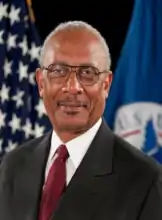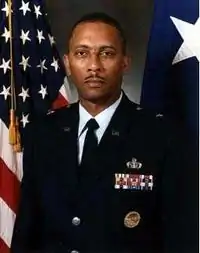Francis X. Taylor | |
|---|---|
 | |
| Under Secretary of Homeland Security for Intelligence and Analysis | |
| In office April 14, 2014 – January 20, 2017 | |
| President | Barack Obama |
| Preceded by | Caryn Wagner |
| Succeeded by | David J. Glawe |
| Member of Privacy and Civil Liberties Oversight Board | |
| In office March 14, 2006 – January 29, 2010[1][2] | |
| President | George W. Bush |
| Preceded by | Position established |
| Succeeded by | Rachel L. Brand[3] |
| Assistant Secretary of State for Diplomatic Security | |
| In office November 18, 2002 – February 19, 2005 | |
| President | George W. Bush |
| Preceded by | David G. Carpenter |
| Succeeded by | Richard J. Griffin |
| Coordinator for Counterterrorism | |
| In office July 13, 2001 – November 15, 2002 | |
| President | George W. Bush |
| Preceded by | Michael A. Sheehan |
| Succeeded by | J. Cofer Black |
| Commander of the Air Force Office of Special Investigations | |
| In office September 1996 – May 2001 | |
| Preceded by | Robert A. Hoffmann |
| Succeeded by | L. Eric Patterson |
| Personal details | |
| Born | Francis Xavier Taylor 1948 (age 75–76) |
| Education | |
| Nickname | "Frank" [4] |
| Military service | |
| Allegiance | |
| Branch/service | |
| Years of service | 1970 – 2001 |
| Rank | |
| Commands | Air Force Office of Special Investigations |
| Awards | |
Francis Xavier Taylor (born 1948)[5] was the Under Secretary of Homeland Security for Intelligence and Analysis at the U.S. Department of Homeland Security (DHS), nominated by President Obama in 2014. In that role, he provided the Secretary, DHS senior leadership, the DHS components, and state, local, tribal and private sector partners with homeland security intelligence and information they need to keep the country safe, secure and resilient. DHS Office of Intelligence and Analysis is a member of, and the Department’s liaison to, the U.S. Intelligence Community.[6]
Taylor was also a member of the Privacy and Civil Liberties Oversight Board from 2006 to 2010. He was the former Assistant Secretary of State for Diplomatic Security from 2002 to 2005, and the United States Coordinator for Counterterrorism from 2001 to 2002. Taylor is also a retired Air Force Brigadier General with his last military assignment as the Commander of the Air Force Office of Special Investigations from 1996 to 2001.[1][2][7][8][9][10]
Biography
Military career
Taylor was educated at the University of Notre Dame, graduating with a B.A. in government and international studies in 1970.[10] Taylor was involved in the Air Force Reserve Officer Training Corps during university and upon graduation, was commissioned as a Second Lieutenant in the United States Air Force.[10] He became a trainee agent in the U.S. Air Force Office of Special Investigations (AFOSI), and then attended the U.S. Air Force Special Investigations School in Washington, D.C.[10] From 1970 to 1972, he was a counterintelligence officer at the Middle East, Africa and South Asia Division at AFOSI.[10] From 1972 to 1974, he attended the Air Force Institute of Technology at Notre Dame, receiving an M.A. in government and international studies in 1974.[10]
Taylor spent 1974–76 in the Acquisition and Analysis Division of AFOSI's Directorate of Counterintelligence.[10] In April 1976, he became chief of the Counterintelligence Acquisition and Analysis Branch in Ankara.[10] He spent 1977–83 at Bolling AFB, D.C., becoming commander of AFOSI Detachment 411 in September 1977; chief of Resource Career Management Division in AFOSI's Directorate of Personnel in April 1979; and then commander of the Headquarters Squadron Section in October 1980.[10] He then spent fall and winter 1983 at the Armed Forces Staff College.[10]

In January 1984, Taylor became deputy director for operations in the Directorate of Counterintelligence and Investigative Programs in the Office of the Under Secretary of Defense for Policy.[10] From July 1987 to July 1988, he studied at the Air War College. In July 1988, he became deputy commander of the 487th Combat Support Group at Comiso Air Station in Comiso.[10] He became commander of AFOSI District 45 at Osan Air Base in July 1990; and then commander of AFOSI Region 2 at Langley Air Force Base in July 1992.[10] He returned to Bolling AFB in August 1994 as director of mission guidance at Headquarters AFOSI.[10]
In August 1995, he became director of special investigations in the Office of the Air Force Inspector General.[10] He spent July 1996 through July 1998 as commander of AFOSI at Bolling AFB, D.C., where he was responsible for providing commanders of all Air Force activities independent professional investigative services in fraud, counterintelligence, and major criminal matters.[10] In August 1998, Headquarters AFOSI moved to Andrews AFB, MD, in August 1998.[10] Taylor has received numerous awards and decorations, including the Distinguished Service Medal, the Defense Superior Service Medal, and the Legion of Merit,[10] Taylor retired from active duty on July 1, 2001.[11]
Effective dates of promotion
| Insignia | Rank | Date |
|---|---|---|
| Brigadier General | September 1, 1996 | |
| Colonel | February 1, 1991 | |
| Lieutenant Colonel | March 1, 1985 | |
| Major | July 1, 1982 | |
| Captain | February 15, 1974 | |
| First Lieutenant | January 15, 1972 | |
| Second Lieutenant | June 6, 1970 | |
Post-military career
In 2001, President George W. Bush nominated Taylor to be Coordinator for Counterterrorism, and Taylor subsequently held this office from July 13, 2001 until November 15, 2002.[9] In this role, he was responsible for implementing U.S. counterterrorism policy overseas and coordinating the U.S. government response to international terrorist activities. In the aftermath of the September 11, 2001, attacks, he was a key advisor in assisting the President Bush and Secretary of State Colin Powell in forming the international coalition against terrorism and developing aggressive international policy implementation to defeat terrorism.
President Bush then nominated Taylor to be Assistant Secretary of State for Diplomatic Security and Director of the Office of Foreign Missions, with a rank of Ambassador. Taylor held this office from November 18, 2002 until February 19, 2005. As Assistant Secretary, Taylor oversaw all Department of State security programs that protect all U.S. government employees and buildings overseas from terrorist, criminal or technical attack, and ensure the integrity of classified national security information produced and stored in these facilities. Leading more than 32,500 US, foreign and contractor personnel, he provided security for all U.S. government employees assigned to over 250 U.S. embassies and consulates worldwide. The Ambassador also directed the law enforcement function of the Bureau, wherein Diplomatic Security Service special agents protect the Secretary of State and foreign dignitaries who visit the United States and conduct criminal investigations of violation of U.S. Visa and Immigration statutes. As Director of the Office of Foreign Missions, Taylor regulated the activities of foreign missions in the United States to protect the foreign policy and national security interests of the United States and safeguard the American public from abuses of privileges and immunities by diplomatic and consular officials.[7][12]
Taylor joined the General Electric Company as Vice President and Chief Security Officer on March 7, 2005. He is responsible for overseeing GE’s global security operations and crisis management processes.[13]
In 2006, Bush appointed Taylor to the Privacy and Civil Liberties Oversight Board.[1]
On February 12, 2014, President Barack Obama announced his intent to nominate Taylor as the Under Secretary of Homeland Security for Intelligence and Analysis for the Department of Homeland Security.[14]
Taylor has also received numerous civilian awards and decorations, including the National Intelligence Distinguished Service Medal and the State Department Distinguished Honor Award.
On August 17, 2017, Taylor was named an executive fellow of the Global Policy Initiative in the new Keough School of Global Affairs at the University of Notre Dame.[15][16]
Taylor is married to Constance O. Taylor and together the couple have three children.
See also
References
- 1 2 3 "Privacy and Civil Liberties Oversight Board". whitehouse.gov. Retrieved December 30, 2018 – via National Archives.
- 1 2 "Public Papers of the Presidents of the United States, Volume 0, pp. 936". Administration of George W. Bush, 2008. February 27, 2008. Retrieved December 30, 2018.
- ↑ "Privacy and Civil Liberties Oversight Board: New Independent Agency Status" (PDF). Garrett Hatch. August 27, 2012. Retrieved December 30, 2018.
- ↑ "Francis "Frank" X. Taylor". CIEE. Retrieved December 28, 2018.
- ↑ "Francis Xavier Taylor (1948–)". Office of the Historian, U.S. Department of State. Retrieved January 12, 2021.
- ↑ "Francis X. Taylor". Cambridge Global. Retrieved March 2, 2018.
- 1 2 "Department of State Archive Biography: Francis X. Taylor". Department of State. November 21, 2002. Retrieved December 30, 2018.
- ↑ "History of the Bureau of Diplomatic Security of the United States Department of State" (PDF). Department of State. October 2011. Retrieved December 30, 2018.
- 1 2 "Serving His Country". Darcy Dehais. October 2018. Retrieved December 30, 2018.
- 1 2 3 4 5 6 7 8 9 10 11 12 13 14 15 16 17 18 "Air Force Biography". Af.mil. Retrieved August 7, 2014.
- ↑ Wanja Eric Naef. "iwar.org profile". Iwar.org.uk. Retrieved January 17, 2012.
- ↑ "Measure, then Act: General Electric CSO Frank Taylor on the Importance of Process Improvements". CSO Security and Risk. Archived from the original on July 2, 2012. Retrieved March 20, 2012.
- ↑ "GE Corporate Staff Officers" (PDF). GE.com. Retrieved March 20, 2012.
- ↑ "President Obama Announces More Key Administration Posts". whitehouse.gov. February 12, 2014. Retrieved April 11, 2014 – via National Archives.
- ↑ "Former Homeland Security official Francis Taylor joins Keough School of Global Affairs". Renée LaReau. August 17, 2017. Retrieved August 17, 2017.
- ↑ "Francis Taylor, Executive Fellow, Global Policy Initiative". Renée LaReau. Retrieved December 28, 2018.
External links
- Appearances on C-SPAN
- Biography at U.S. Air Force
- Biography at U.S. Department of State
- Biography at U.S. Department of Homeland Security